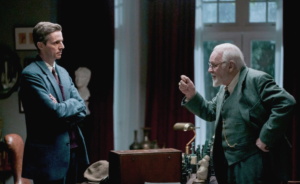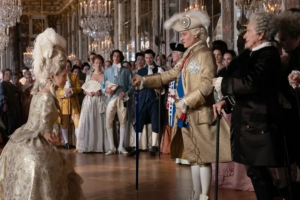DALILAND Reviewed by GREG KING
Director: Mary Harron
Stars: Ben Kingsley, Barbara Sukowa, Christopher Briney, Rupert Graves, Ezra Miller, Alexander Beyer, Mark McKenna, Andreja Pejic, Zachary Nachbar-Seckel, Avital Lvova.

Salvador Dali (played here by Oscar winner Ben Kingsley) is one of the most famous artists of the twentieth century, renowned for his striking and bizarre imagery and of course that iconic moustache.
The film is mainly set in 1974. For a couple of months every year Dali and his wife Gala (played by German actress Barbara Sukowa, from White Noise, etc) spend winter in the St Regis Hotel in New York. This year there is to be an exhibition of his work held at a gallery. James Linton (played by newcomer Chistopher Brinley in his feature film debut) is an art school dropout who works as an assistant in the gallery. He is sent by the owner Christoffe (Alexander Beyer) to keep an eye of Dali and to ensure he focuses on producing enough new works for the exhibition. James is seduced, in more ways than one, by the extravagant and flashy lifestyle and hedonistic excesses of the Dalis and their entourage. The handsome young man catches the eye of both Dali and Gala. Hired to work as Dali’s assistant he soon gets caught up in the hedonistic lifestyle but comes to experience the darker side of the glamourous art world and fame.
Gala for her part is obsessed with Broadway actor jeff (Zachary Nachbar-Seckel) who plays the title role in a production of Jesus Christ Superstar and invests time and money in trying to help him establish a solo musical career. Dali is raking in the money (there is some suggestion that he is also involved in the distribution of fake prints of his art works) but his profligate lifestyle and the expensive demands of Gala mean that the couple burn through their money quickly. Dali needs to maintain his output to ensure that the cash keeps rolling in.
This film has been directed by Mary Harron (American Psycho, etc) who has also previously explored the world of contemporary artists like Andy Warhol (I Shot Andy Warhol) and Betty Paige (The Notorious Betty Page). Daliland is not a straightforward biopic of the artist, though, as it is mainly set in 1974 when his fame was waning. The film has been written by John Walsh (Harron’s husband) and it takes some liberties with the facts for dramatic purposes and fails to provide much depth or insight into the artist. For example, the character of James is fictitious and is actually a composite from a number of young assistants who worked for Dali. However, it is through his naïve perspective that we see events and learn about how the art world actually operates.
The film is bookended by a couple of sequences set in 1985, when the older Linton hears a news report that Dali has been severely injured in a fire in his studio and this causes him to reflect back on that brief period he spent in his world.
Dali is depicted here as egotistical and narcissistic, and he always refers to himself in the third person, and Kingsley revels in the opportunity to play him as a flawed character, capturing some of his eccentricities and flamboyant nature. Sukowa portrays the money hungry and manipulative Gala as overly indulgent and controlling, and given over to fits of temper in which she often beats the servants and throws things at them. There are also a couple of brief flashbacks in which we meet the younger Dali (now played by Ezra Miller) when he first meets Gala. (Miller was originally cast as James, but due to a scheduling conflict was cast in the smaller role of the younger Dali.) Beyer is a little smarmy as his character represents the more ruthless and cutthroat nature of the art world. And Rupert Graves brings a hint of gravitas to his role as Captain Moore, the loyal and urbane long-time secretary who tries to keep Dali’s world moving along as smoothly as possible.
The film boasts some great production values, with Hannah Edwards creating some outlandish costumes for Dali’s extravagant parties, and production designer Isona Rigau has done a superb job in creating the chaotic apartment that the Dali’s call home in the hotel. Harron was apparently denied permission by the Dali estate to use some of his most iconic artwork for the film.
Daliland is a film of modest interest as Harron and Walsh don’t really provide a lot of insight into his life and art.
★★★



